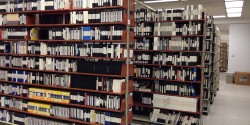Happy New Year and welcome back to the Radio Survivor Academic Series!
For this first post of 2015 I want to call attention to a recent online series on archives by members of the Radio Preservation Task Force and pass on some information about four upcoming conferences related to radio studies, that focus on radio and sound.
Radio Preservation Task Force Series on In Media Res
Last week, the Task Force was the focus of In Media Res, which is a site dedicated to experimenting with collaborative forms of online scholarship where writers curate and respond to a short visual clip. The weekly feature on RPTF had daily contributors curating under-researched topics at major broadcast archives.
Archives featured throughout the series include the University of Maryland’s Special Collections in Mass Media & Culture (SCMMC) and the Daniel del Solar collection at the University of California, Santa Barbara. As co-curators Josh Shepperd and Douglas Gomery note, the SCMMC is home to the Library of American Broadcasting and National Public Broadcasting collections, which hold over one hundred thousand audio tapes and CDs and hundreds of thousands of pages of primary documents. Dolores Ines Casillas, who curated the post on the Daniel de Solar collection, informs us that the collection includes over 3,000 items donated from del Solar’s estate, consisting of audiotapes, short films, and photographs. Daniel del Solar was a prolific Latino media activist who began his work at Berkeley, California’s KPFA.
The third post in the series, co-curated by Cary O’Dell and Christopher Sterling at the Library of Congress, includes a short clip of an interview with broadcaster and oral historian Studs Terkel from 1975, in which he tours his WFMT archive. O’Dell and Sterling explain that Terkel’s 15-minute chat with the author and activist James Baldwin “is of particular interest in that they have a thoughtful discussion about topics that are usually primed for controversy. And their exchange stands in stark contrast to the current state of talk radio, and, increasingly, all political discussion.”
Susan Brinson’s post on the Airman Broadcasts at the Tuskegee University Archives explains that its archivists do not have the time, resources, or support needed to process the hundreds of audio recordings they hold (a common concern amongst the archivists I spoke with in my work with the Task Force). This is a particularly worrisome situation as support for higher education recedes. Brinson points to the fact that the Tuskegee archives hold some of “the few moments in which the voices of significant Black Americans both were broadcast over radio and recorded,” and that the loss of this collection would be very significant. However, she is hopeful that the Task Force’s work with the archive will help call attention to the immense importance of this collection.
The final post in the series, curated by Michele Hilmes, profiles the Wisconsin Historical Society’s holdings of singer-songwriter Millard Lampell’s papers. Lampell’s work with the ballad opera, a variant of the radio feature, is part of a “fascinating ‘lost’ aspect” of U.S. radio history, according to Hilmes, because this is where folk music, radical politics, and the radio feature converge.
I encourage readers to visit this great feature over at In Media Res and to spend some time watching and listening to the short clips that accompany each writer’s response.
Also of note to radio scholars and those who are interested in the scholarly study of radio are two upcoming conferences.
Upcoming Conferences Related to Radio and Sound
The Midwest Chapter of the Society for Ethnomusicology is holding its annual conference from the 17th to the 19th of April, 2015 at the University of Illinois at Urbana-Champaign. The conference welcomes submissions from students, teachers, and independent scholars in a variety of fields including musicology, popular culture studies, and sound studies. Proposals are due on February 15th, 2015 and should include an abstract of 250 words. More information on submitting to the conference can be found on the conference’s website.
On Friday May 22nd, 2015, the Michigan Sound Conference will take place at the Detroit Public Library. The central question to be explored during the conference asks, “How has Michigan generally, and Detroit in particular, been a leader in the creation of the global modern soundscape?” The deadline for presentation and workshop proposals is Friday February 6th, 2015. Those interested are asked to submit a 250 word abstract plus a 100 word bio to Conference Chair Denise Dalphond. Contact information and application instructions can be found here. The event is free and open to the public.
“The Borders of Radio” conference has just announced its call for papers. It will take place on June 4th and 5th at the University of Perpignan Via Domitia. This international and interdisciplinary conference “examines both the physical and immaterial borders of radio, in the fields of geography, technology, economics, formats, history, sociology, languages, contents, art and literature.” Areas of interest for the conference include the “Creative Territories of Radio,” “Radio Classification and its Place in Society,” and “Transformations of Radio.” Submissions are due on February 23rd, 2015 and proposals of 400 words (in French, English, or Catalan) can be sent to colloqueradioperpignan@gmail.com. More information on the submission process and the conference can be accessed here.
Also in June is the International Association for Media and History conference, which will take place in Bloomington, Indiana this year. The conference theme is “Media and History Revisited” and papers on radio (as well as other media) that shed light on recent or longstanding historical topics are welcome. The submission deadlines has just been extended until March 1st, 2015 and more information can be found on the conference website.



